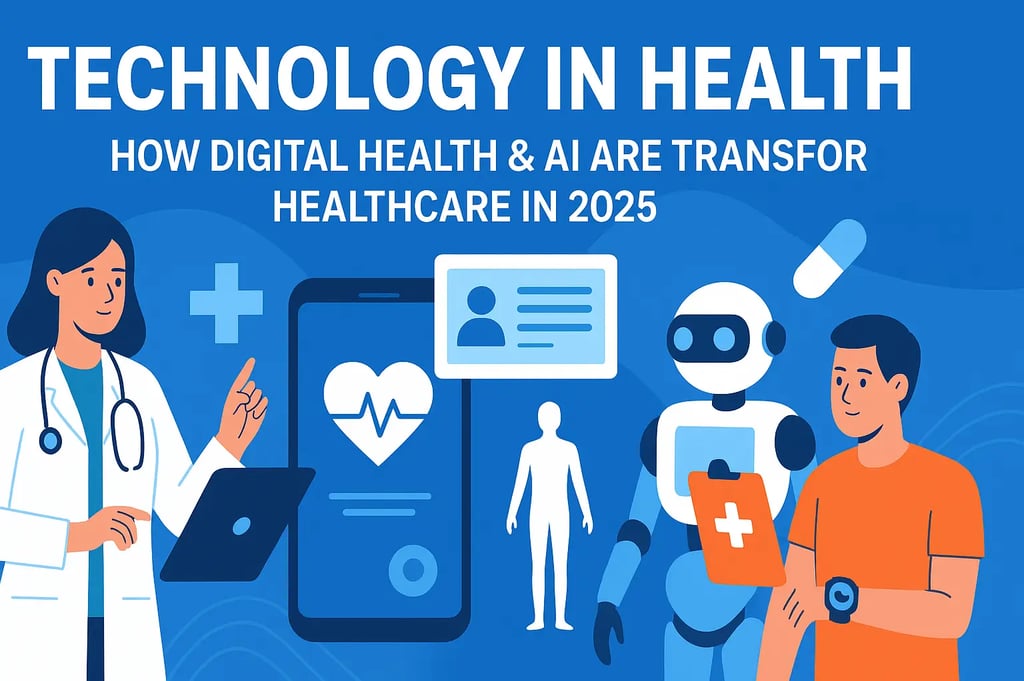Technology in Health: How Digital Health & AI are Transforming Healthcare in 2025
Discover how digital health and artificial intelligence (AI) are revolutionizing healthcare in 2025. Learn about telemedicine, wearable devices, AI diagnostics, and future trends in medical technology.


Technology in Health: How Digital Health & AI are Transforming Healthcare in 2025
The healthcare industry is experiencing a massive transformation in 2025, powered by digital health technologies and artificial intelligence (AI). From telemedicine to smart wearables and AI-driven diagnostics, technology in health is not just a trend—it is reshaping how patients access care, how doctors provide treatment, and how healthcare systems operate.
In this article, we’ll explore how digital health and AI are changing the future of medicine and what it means for patients, doctors, and society.
📱 What is Digital Health?
Digital health refers to the use of technology, data, and connectivity to improve healthcare delivery, patient outcomes, and medical research. It includes:
Telemedicine – Virtual doctor consultations through apps and video calls.
Wearable devices – Smartwatches and trackers that monitor heart rate, sleep, and fitness.
Mobile health apps – Tools for diet tracking, mental health, or chronic disease management.
Electronic Health Records (EHRs) – Digital storage and sharing of medical history.
According to a 2025 report by MarketsandMarkets, the global digital health market is expected to surpass $650 billion, proving its vital role in modern healthcare.
🤖 Role of Artificial Intelligence in Healthcare
AI in healthcare is revolutionizing everything from diagnostics to drug discovery. Unlike traditional systems, AI uses machine learning, predictive analytics, and natural language processing (NLP) to provide smarter, faster, and more accurate healthcare solutions.
Some key applications of AI in health:
AI Diagnostics – Tools like Google’s DeepMind and IBM Watson help detect cancer, heart diseases, and neurological disorders at early stages.
Medical Imaging – AI scans X-rays, MRIs, and CT images faster than humans, reducing human error.
Drug Development – AI shortens the time for new drug discovery and vaccine development.
Virtual Health Assistants – AI chatbots guide patients on symptoms, medications, and appointments.
👉 In 2025, AI-assisted diagnostics are reported to be 30% faster and 20% more accurate than traditional methods.
🌍 Benefits of Technology in Health
Accessibility – Remote areas can access healthcare via telemedicine.
Affordability – Digital health reduces unnecessary hospital visits, saving costs.
Personalization – AI provides custom treatment plans based on genetic and lifestyle data.
Early Detection – AI can identify diseases in early stages, improving survival rates.
Efficiency – Hospitals use AI for scheduling, patient management, and resource optimization.
📊 Examples of Digital Health Innovations in 2025
Apple & Samsung Wearables – Advanced smartwatches now track ECG, oxygen levels, stress, and sleep apnea.
AI-powered Telehealth Apps – Platforms like Teladoc and Practo are integrating AI-driven symptom checkers.
Robotics in Surgery – Robotic-assisted surgeries offer higher precision and reduced recovery time.
Blockchain in Healthcare – Secure patient data sharing without privacy risks.
⚠️ Challenges of Digital Health & AI
Despite its advantages, technology in health faces some challenges:
Data Privacy Concerns – Handling sensitive medical data securely.
High Costs – Advanced AI tools and wearables may not be affordable for everyone.
Digital Divide – Rural areas may lack internet or digital literacy.
Ethical Questions – Can AI replace doctors? Who is responsible if AI makes an error?
🔮 The Future of Healthcare with AI & Digital Health
Looking ahead, the future of digital health and AI looks promising. In the coming years, we may see:
AI-powered personalized medicine based on DNA analysis.
Widespread use of virtual reality (VR) for mental health therapy.
Smart hospitals using IoT devices for real-time patient monitoring.
Greater integration of AI + robotics in elderly care and rehabilitation.
Experts predict that by 2030, nearly 40% of all medical decisions will be assisted by AI technology.
✅ Conclusion
Technology in health is revolutionizing the way we approach medicine in 2025. From AI-powered diagnostics to digital health apps and wearable devices, innovations are making healthcare more accessible, accurate, and patient-friendly.
While challenges like privacy and affordability remain, the combination of digital health and AI promises a healthier, more connected future for humanity.
Frequently asked questions
Q1: What is digital health?
Digital health is the use of technology like mobile apps, wearables, telemedicine, and AI to improve healthcare delivery and patient outcomes.
Q4: Can AI replace doctors?
AI supports doctors by providing insights and reducing errors, but human expertise remains essential.
Q2: How is AI used in healthcare?
AI is used for diagnostics, medical imaging, drug discovery, chatbots, and patient management systems.
Q5: What is the future of AI in healthcare?
The future includes personalized medicine, smart hospitals, robotic surgeries, and AI-powered preventive care.
Q3: Is telemedicine safe and effective?
Yes. With proper regulations, telemedicine offers safe, quick, and cost-effective medical consultations.
